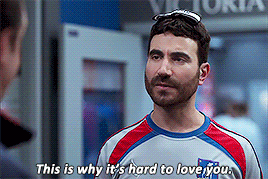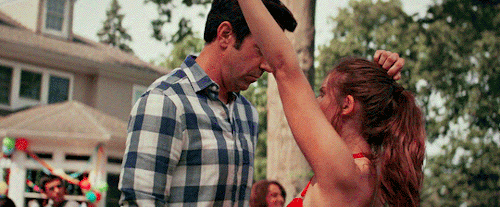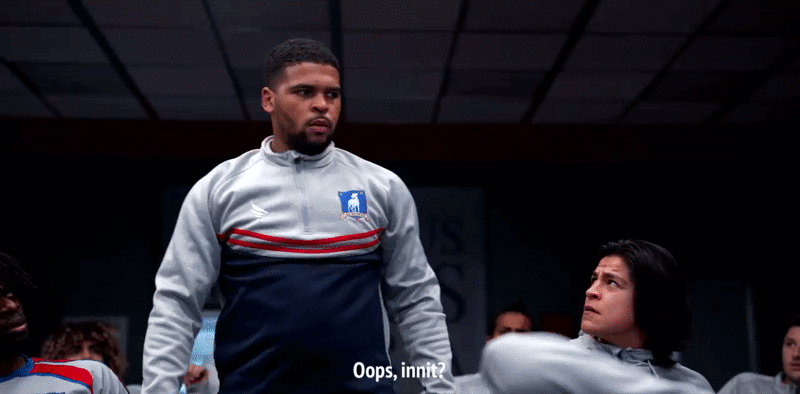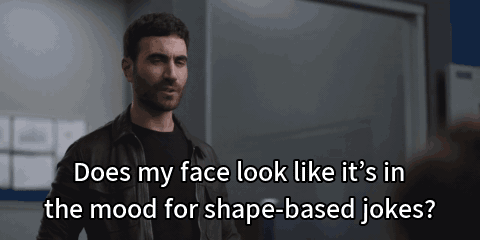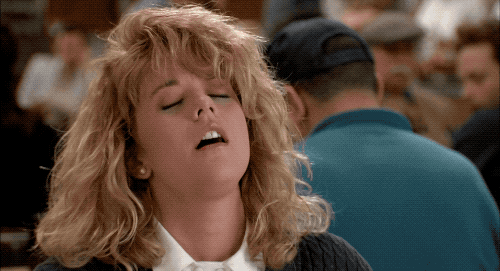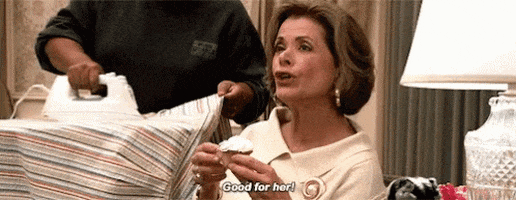March 2021: Ted Lasso + Feminism, Actually
Preliminary Note 1: As per the usual, we went too long for gmail to handle! If you’re reading this in gmail, at the very bottom you’ll see a note that says “[Message clipped] View entire message” and by clicking that link you’ll be able to see the whole thing, and you can also always access the newsletter on the Pop Culture Pen Pals Substack website by clicking on the title. Thanks for reading!
Preliminary Note 2: We want to note that we are aware of the criticism against Substack for providing a platform for a number of writers who have been using it to engage in transphobic harassment and rhetoric. Our current hope is that Substack will resolve this by taking a firm stance against this behavior and meaningfully act on that stance, but we are also considering alternative platforms.
Dear Kelsey,
True to form, I am extremely late with this newsletter. It’s already the first week of April as I type this. Truthfully, this early season of parenthood is kicking my butt, and I only have 12 hours of childcare per week(!) to cram all of my work into. Hence, the late newsletter. But I am THRILLED because this month I strong-armed you into one of my favorite TV shows of the last year: Ted Lasso.
When I first tweeted about my love for Ted Lasso and the magic of this show, someone replied commenting how the show is so feminist because it passes the Bechdel test. The Bechdel test, for those of you who are not familiar, was invented by Alison Bechdel, writer of graphic memoirs such as Fun Home and Are You My Mother?, and the cartoonist behind the famous comic, Dykes to Watch Out For. The Bechdel Test actually comes from a strip of Bechdel’s comic, published in 1985:
That’s it. That’s the whole thing we formally consider the ~Bechdel Test~ today. A test from a comic strip is not exactly scientific in nature. But even if it was “scientific”, I’d still have concerns about how we can quantitatively measure the existence of feminism in a movie. Which is why it’s so grating to have many feminists treat this “test” as the definitive statement on whether a TV show is decisively feminist….or why it’s not.
Perhaps more broadly though, why do we crave the need to stamp our media with the label “feminist” or “not feminist”? Dianna Anderson notes this trend in their book, Problematic: How Toxic Callout Culture is Destroying Feminism, arguing that creating a binary of “good” and “bad” media, and requiring all “good” media to only display unproblematic protagonists with flawless social politics, are harmful to both feminism as a whole and the breadth of human complexity we allow to be represented in our art.
But perhaps our craving for politically unproblematic protagonists is one of the reasons Ted Lasso became so beloved in this particular political moment. Without being preachy or didactic, Lasso tells a story that involves growth and development for every character without relying on sexist stereotypes or turning the women into tools for men’s growth. The show even goes so far as to lecture several men on their gender politics mid-series (thinking especially of the episode where Ted and Roy wrestle with their sexual histories and the histories of the women they’ve chosen to sleep with). The entire plot of this show is about white male mediocrity—Ted would not be nearly as beloved or lovable as a goofy ball of cheerfulness if he were not a white man, but the appearance of self-awareness is enough for us to forgive his missteps and put him firmly in the canon of “good” television.
It may sound like I’m being hard on the show, which isn’t my intent, but I think understanding what Ted Lasso is (and isn’t) can shine some light on who we are and why we love it. I think even our reluctance to critique it demonstrates how we’ve learned that we can’t love something and also find it worthy of criticism—hence the issue with the good/bad binary in art.
Ted Lasso tells the story of a tender-hearted, earnest, lonely man who is brave enough to seek connection with others, even when it consistently leads to his rejection. But Ted also keeps those in his life at arms length by only ever being happy, all the time. His constant upbeat energy may be fun, and he may be eager to focus on those around him, but the lack of reciprocity of care in his life often leaves Ted at the end of the day feeling utterly alone. Ted must also go on a journey of his own: one where he must allow himself to experience his anger, grief, and fear. As he becomes brave enough to express his true emotions—even the unhappy ones—with others, he gives them the opportunity to nurture and care for him in return.
A short feel-good comedy on an up-and-coming streaming service with only one big name (Jason Sudeikis, the internet’s DILF) might not have taken off under any other circumstances. Lasso, like Jeff Bezos, has benefited greatly from all of us being stuck indoors for a year. Even other comedy shows on Apple TV+ that would target a similar demographic, like Mythic Quest (starring Rob McElhenny from It’s Always Sunny in Philadelphia), have not seen the same levels of success. Lasso stumbled onto us at just the right time, and we are all better for having been so lucky.
One of the magical things about Ted Lasso is that everyone makes choices that allow them to grow and become better people over the course of the season. So rarely do we see characters that make choices we can support. I not only found myself thrilled for the choices that each character was making (except for Jamie), I even found myself learning from the characters. It’s no secret that my favorite character is Keeley, and I think often of when Rebecca is trying to decide whether to tell Ted the truth about her sabotage, and Rebecca says, “What’s the point of telling him this late, it won’t change anything,” to which Keeley replies, “It would change how I feel about you.” It’s a moment they don’t hang on long, but it’s one that stuck with me—maybe because Keeley’s earnestness is so touching and refreshing in a TV landscape that is mostly poisoned with irony.
When we meet Keeley in episode 1, I immediately wrote her off as the basic mean girl/hot chick dating the popular guy, because that’s what comedies do, right? I’ve never been so happy to be wrong. Keeley is the heartbeat of this show in the way it wants Ted to be. I like Ted, but this show holds no substance without Keeley. Keeley and Roy, and their arcs—separately and together—are the axis this show spins on. I’ll admit it, I cried multiple times during their scenes, and I know I’m not the only one. This show invites a particular kind of vulnerability that feels intimate, even as we know these characters are purely fictional.
I will watch this show again and again, because each time I find new layers of insight into what it means to be human, what it means to be in relationship with others, and what it means to need to nurture and be nurtured. All of these people, learning to give and receive love, are mirroring us as an audience, still learning how to give and receive love with one another. There is no bigger drama of human life than learning how to love and be loved.
May you have a chance to give and receive love today.
All my love,
Hannah
Dear Hannah,
True to form, I do not have an infant but am exceedingly grateful to yours for buying me a little extra time this month (and for being the bright-eyed little angel she is, OBVIOUSLY). What I do have is a movie review I’m procrastinating and a handful of Reese’s Cups, so let’s do this thing!!
The thing about the hype around Ted Lasso is that most of the championing around it featured foremost its “nice” “warm hug” qualities, which, as documented at various points in the history of this newsletter, is not generally the way to get me to watch something. What y’all NEGLECTED TO MENTION is that one of the main characters on the show is a tall aggressive blonde woman????? I am feeling neither SEEN nor HEARD!!!

The thing about Ted Lasso as a show is that…..well….I already have a favored show about a tall bumblingly-kind brunette American man moving to the UK!
The thing about Ted Lasso as a person is that he is essentially my own personal babadook. If you were to put me in the Bad Place (fair) and put me in proximity with someone specifically designed to torture me with simply their personality, it would be with someone as aggressively friendly and positive who wanted to have deeply personal conversations with me less than five minutes into our acquaintance. Hell!!!
The thing about Jason Sudeikis, however, is that I find him incredibly hot.
The other thing about Ted Lasso, the show, is that it is honestly frequently quite funny! The jokes are very good! I laughed maybe the hardest I had in 2021 when Isaac threw a chair at the TV and then when the room went quiet and everyone looked at him said, “Oops, innit”!
So obviously this show proved quite the dilemma.
As a whole it made a lot more sense to me when Appointment Television (I told you they were the boss of me) pointed out that the show was co-created by Bill Lawrence, who also created/co-created a number of shows (Scrubs and Cougar Town) that are basically antagonist-free. The man just wants everyone to get along and be friends! And that’s fine! And I totally get why Ted Lasso and other low-conflict feel-good shows have really been go-tos during the last year; I’ve experienced that pull too!
I’m very with you on the Roy/Keeley arcs, but I also feel that I was sold a bill of goods in the hype about how much time those arcs took up in the story that was not quite fulfilled? This may simply because much of the time when I am not actively reading a romance novel I am thinking “this would be better if it were more like a romance novel,” and thus the parts of the show that were very like a romance novel really appealed to me.
I think what really saved this show for me is how respectfully it treated its grumpier characters, like Roy and Rebecca [who, I can’t stress enough, should call me]. (Also, Isaac hasn’t had much to do yet, but I really liked that Roy chose him as the next captain rather than “learning a lesson” and choosing someone “sunshiney-er” and I hope he gets his own arcs next season.) With Ted’s chipperness at the center of the show, and his extreme positivity clearly marked as transformative, it would be easy for the show to cast the grumps as either soulless villains or force them to totally abandon their reservations and have a personality makeover in order to be part of the team. The thing I respect about Ted Lasso as a person is that, as hard as he tries to win people over, he doesn’t actually seem to see their resistance as a personal affront, which is a relief.
I know I’ve complained about a lot of things, but I did genuinely like a lot about the show. I’ll probably watch the second season! I really like and strongly agree with everything you said about the great way the show treats its women characters. (I was actually so confident that this would be true that I wrote it down before I’d even seen your letter--and look, I was right!) So the final thing is: it’s okay that it didn’t land for me that it landed for a lot of other people. I’ve been trying to cultivate an attitude that allows for me just not really vibing with a thing without there being a Reason It Is Bad, Actually, which is actually a great lead-in to the next topic!
~Feminist Movies/TV/media generally~
This is one of those topics, among many others, that makes me extremely grateful for our friendship, because I have sent you so many half-baked thoughts on this via text or DM that I might otherwise have taken to the timeline and tried to express in 280 character chunks that would have started pointless and frustrating arguments, most likely with people I barely know.
I honestly have come to dislike even the phrase “Bechdel Test,” because, as you noted, it was never intended as a test. Thank you for sharing the comic in yours, because hopefully people will have noticed that the word ‘test’………literally never appears in it. The comic isn’t presenting a rubric or measuring tool for how feminist a movie is, it’s highlighting how infrequently those qualities occur in movies and validating the characters’ interest in prioritizing narratives in which women aren’t set dressing to men’s arcs.
My frustrations with the use of this as a “test” grew when I started listening to a podcast that I’m not going to name but would probably be easy to identify because they use it as the basic premise of their podcast. And though I’ll give them the credit of not basing their judgement of the movies they discussed wholly on the three “requirements” I grew more and more frustrated by the way it guided their discussions in ways that I don’t believe it was ever meant to, like complaining that The Women, a 1939 movie with no men in it, wasn’t feminist because “they were talking about men the whole time!” (which is, indeed, almost exactly the tagline of the movie). Does it matter that the conversations are less “about men” than they are about the characters trying to figure out dignified choices for themselves in a time when they were beginning to have more options but knew their lives would still be interpreted by how they related to men? Guess not! And then they said Meg Ryan wasn’t funny and I finally quit listening wholesale.
The other piece of this puzzle for me is that the Promising Young Woman discourse is GETTING TO ME. (Don’t worry, I’m not about to go into the particulars of Promising Young Woman, though if you’re interested in the particulars, might I recommend…..my own review?) Sorry if this is a spoiler, but the movie has a bit of a ~controversial~ ending, as is the premise itself. I myself really liked the movie; the ending is a gut punch but it landed with me and, to me, made the movie work in a way it might not otherwise. That being said, there are really valuable critiques of it, and if you’re interested in reading a bunch of takes about the movie, both favorable and un-, Jordan Crucchiola has compiled a whole thread of them.
However, I’m nearly to the point of muting “Promising Young Woman” and all related terms, because the takes specifically related to whether or not this movie is “empowering” (and, the implication is, therefore “feminist”) are getting...out of hand. It’s either not empowering because there’s not enough violence or because there’s too much, it’s too morally simplistic or too morally grey, it’s too traumatic or it takes trauma too lightly, and like…….who decided that the purpose of movies, especially movies about trauma, was to be empowering? Why do movies about women in particular need to be “empowering”? Is it more important to feel “empowered” by a movie than seen? [Caveat: many people did not feel seen by PYW, which I think is a much more worthy conversation than whether anyone felt empowered by it.]
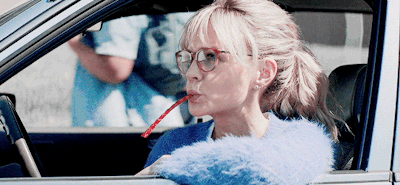
I texted you a few months ago saying that I think sometimes when people ask whether a movie is feminist they are asking whether it resolves in a way that makes them feel good about gender. Does it make patriarchy feel fixable (whether or not it also fixes white supremacy, ableism, transphobia, and the myriad other systems of oppression that inform gender and often end up secondary if acknowledged at all by those the system privileges)? Does it make “empowerment” out to be not only attractive but achievable?
Is “feminist” a quality, or a framework?
These aren’t new questions, but I feel like a lot of discussions about film and tv lately have been working overtime to “solve” them, spending time attempting to judge whether a particular film or show checks a series of boxes rather than dwelling on more ruminative and less concretely measurable questions that feminist film criticism as a point of view invites us to ask. What is the narrative saying to us about gender, and people who are marginalized for theirs? To whom is the movie speaking, and who gets to do the speaking itself? Are there contradictions between what is being said out loud about gender out loud and what is being conveyed visually?
I don’t really have a resolution to this section, to which I am assigning a meaning of “staying on theme,” rather than the more accurate “brain is tired.”
Thank you for choosing the interesting questions with me.

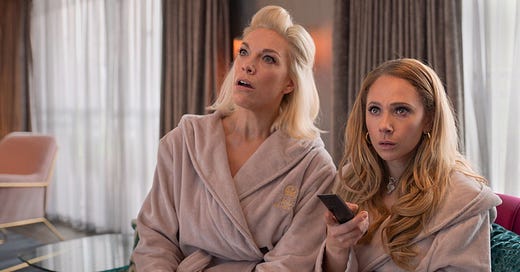

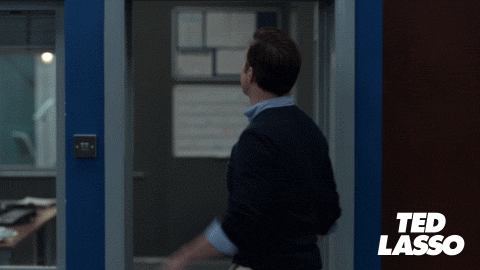
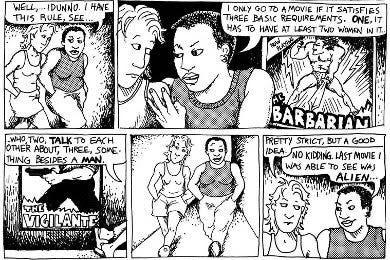
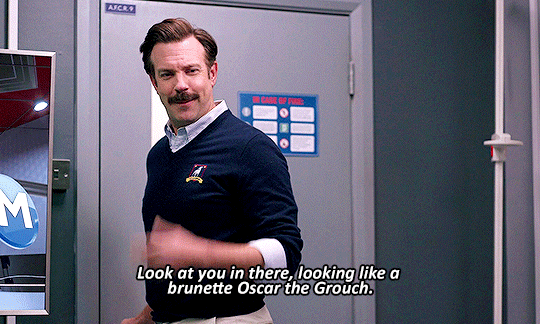


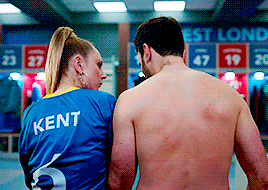
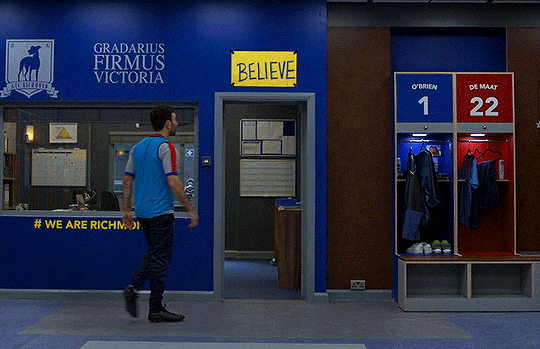
![The cast of Ted Lasso at a karaoke bar; Rebecca is singing and the caption reads "[sings "Let it Go" like a goddess]" and then cuts to everyone cheering and the caption reads "[everyone loses their minds]" The cast of Ted Lasso at a karaoke bar; Rebecca is singing and the caption reads "[sings "Let it Go" like a goddess]" and then cuts to everyone cheering and the caption reads "[everyone loses their minds]"](https://substackcdn.com/image/fetch/$s_!kDkB!,w_1456,c_limit,f_auto,q_auto:good,fl_lossy/https%3A%2F%2Fbucketeer-e05bbc84-baa3-437e-9518-adb32be77984.s3.amazonaws.com%2Fpublic%2Fimages%2Fd0a9674d-fc8e-476f-9588-e4d56e617c94_540x269.gif)

